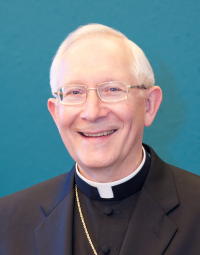
Archbishop Leonard P. Blair
Over the last half century, there has been a great upheaval in the life of our society. Consensus about fundamental moral issues has broken down, for example, with regard to the protection of unborn life and the very definition of marriage and family. In the Catholic Church, this tidal wave of cultural and social change has given rise to a situation in which some people claim to be Roman Catholic and yet dissent from fundamental teachings of the Catholic Church. Sometimes they do in a public manner that is scandalous, sometimes out of ignorance of what their own Church believes and teaches, and other times not.
As moral teachers and leaders, the U.S. Bishops have urged a political engagement by the Catholic people “shaped by the moral convictions of well-formed consciences and focused on the dignity of every human being, the pursuit of the common good and the protection of the weak and the vulnerable.” As the November elections draw near, I encourage everyone to consult the U.S. Bishops’ teaching document Faithful Citizenship on the archdiocesan or USCCB websites. It calls attention to key themes that should inform people’s voting decisions. Not surprisingly, first and fundamental to everything else is the right to life and the dignity of every human person; then the call that everyone has to family, community and participation; the morality of both rights and responsibilities; an option for the poor and vulnerable; the dignity and rights of workers; human, global solidarity; and caring for God’s creation. In Faithful Citizenship, we bishops point out that “our focus is not on party affiliation, ideology, economics or even competence and capacity to perform duties, as important as such issues are.” Rather, we focus on what protects or threatens human life and dignity, and we hope that in casting their votes Catholics will be guided by the following considerations:
- Keeping our nation from turning to violence to address fundamental problems — a million abortions each year to deal with unwanted pregnancies, euthanasia and assisted suicide to deal with the burdens of illness and disability, the destruction of human embryos in the name of research, the use of the death penalty to combat crime and imprudently resorting to war to address international disputes.
- Protecting the fundamental understanding of marriage as the lifelong and faithful union of one man and one woman and as the central institution of society; promoting the complementarity of the sexes and rejecting false “gender” ideologies; and providing better support for family life morally, socially and economically, so that our nation helps parents raise their children with respect for life, sound moral values and an ethic of stewardship and responsibility.
- Achieving comprehensive immigration reform that offers a path to citizenship, treats immigrant workers fairly, prevents the separation of families, maintains the integrity of our borders, respects the rule of law and addresses the factors that compel people to leave their own countries.
- Helping families and children overcome poverty: ensuring access to and choice in education, as well as decent work at fair, living wages and adequate assistance for the vulnerable in our nation, while also helping to overcome widespread hunger and poverty around the world, especially in the areas of development assistance, debt relief and international trade.
- Providing health care while respecting human life, human dignity and religious freedom in our health care system.
- Continuing to oppose policies that reflect prejudice, hostility toward immigrants, religious bigotry and continuing to com-bat any unjust discrimination. (In light of recent events in our country, we need to take positive steps to overcome the legacy of injustice, including vigorous action to remove barriers to education, protect voting rights, support good policing in our communities and ensure equal employment opportunities.)
- Encouraging families, community groups, economic structures and government to work together to overcome poverty, pursue the common good and care for creation, with full respect for individuals and groups and their right to address social needs in accord with their basic moral and religious convictions.
- Establishing and complying with moral limits on the use of military force — examining for what purposes it may be used, under what authority and at what human cost — with a special view to seeking a responsible and effective response for ending the persecution of Christians and other religious minorities in the Middle East and other parts of the world.
- Joining with others around the world to pursue peace, protect human rights and religious liberty and advance economic justice and care for creation.
As we prepare to vote, please join me in working and praying for peace and unity in our nation and in the world.
